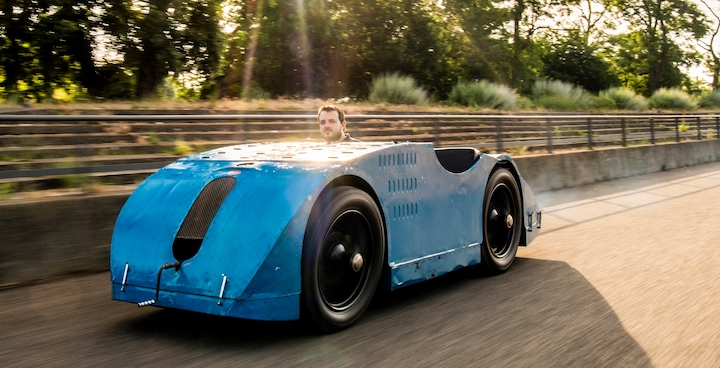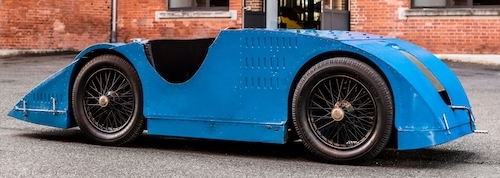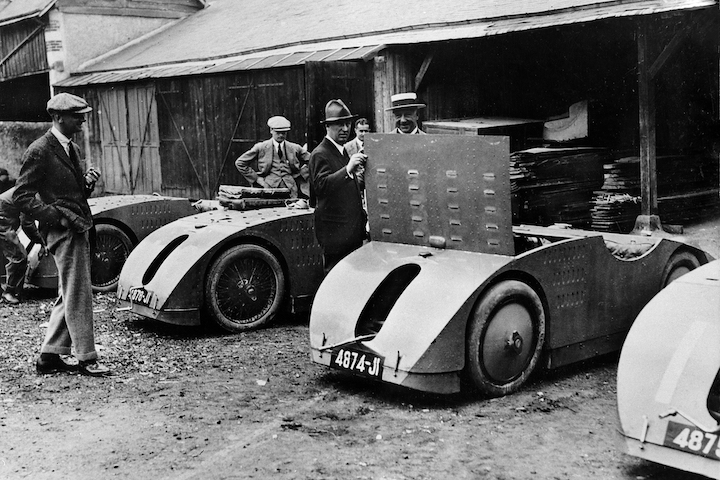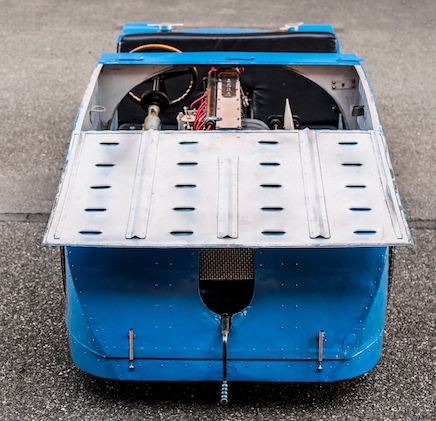100th anniversary of trailblazing Bugatti Type 32 ‘Tank’ is celebrated

(July 3, 2023) MOLSHEIM, France — Bugatti is known across the world for visionary engineering and ingenious designs, and today the brand celebrates the official centenary of the racing debut of one of its most innovative cars — the Type 32 "Tank." This streamlined racing car was to lay the foundations for aerodynamic motorsport innovations, earning its nickname not only for its shape, but also for its visible rivets and bolts.
The occasion was the French Grand Prix of 2 July 1923, the venue the city of Tours in the beautiful Loire Valley, where 300,000 spectators gathered to enjoy an event that promised plenty of high-octane excitement from an array of cutting-edge race cars. The car that attracted the most attention, however, was the bold machine that was testament to the genius of Ettore Bugatti, and his relentless quest for improvement by defying convention.
 What immediately caught the eye about the slipstreamed Type 32 was the airplane-inspired wing-shaped body, a result of Bugatti’s conviction that advanced aerodynamics would have an increasingly important role to play in enhancing the performance of racing cars. Although under the skin it was based heavily on the Type 30 — with its 2.0-liter eight-cylinder engine developing in the region of 90 horsepower — the unusual fairing, relatively short wheelbase and narrow track meant it looked like little else on the grid and caused a stir among the watching fans.
What immediately caught the eye about the slipstreamed Type 32 was the airplane-inspired wing-shaped body, a result of Bugatti’s conviction that advanced aerodynamics would have an increasingly important role to play in enhancing the performance of racing cars. Although under the skin it was based heavily on the Type 30 — with its 2.0-liter eight-cylinder engine developing in the region of 90 horsepower — the unusual fairing, relatively short wheelbase and narrow track meant it looked like little else on the grid and caused a stir among the watching fans.
The car benefited from numerous innovative engineering solutions, techniques and designs. There was an underslung chassis and front hydraulic brakes, while a three-speed and reverse transaxle transmission added to the sense of adventure. Unsurprisingly, such an unorthodox car — with dramatic idiosyncratic looks – was very much the center of attention, standing out from a line-up of racers that adhered to widely used and instantly recognizable design norms that were typical at the time for a motorsport car.

In total, five Type 32s were built — a prototype plus the four cars which took part in the Grand Prix, an affair that constituted a grueling 35 laps of the 22.83-kilometer (14-mile) circuit on public roads, for a total distance of just under 800 kilometers (497 miles). Of these four cars, the most successful was piloted by French driver Ernest Friderich, who finished third, completing the race in seven hours and 22.4 seconds at an average speed of just over 112 km/h (69.5 mph).
 It was a creditable finish for the Type 32, but Tours was to prove its only GP appearance, as Bugatti instead focused on developing the iconic Type 35. This legendary Bugatti featured a host of new ideas — including the introduction of alloy wheels — and enjoyed phenomenal success, winning the Grand Prix World Championship in 1926.
It was a creditable finish for the Type 32, but Tours was to prove its only GP appearance, as Bugatti instead focused on developing the iconic Type 35. This legendary Bugatti featured a host of new ideas — including the introduction of alloy wheels — and enjoyed phenomenal success, winning the Grand Prix World Championship in 1926.
Despite its short GP career, the Type 32 proved an invaluable exercise for Bugatti, and many of the lessons learned were ultimately to pay dividends. In particular, the belief that aerodynamic efficiency could play such a pivotal, decisive role was proven conclusively in another race car whose streamlined, enclosed body earned it the "Tank" moniker, the 57G. It dominated endurance racing for a glorious period in the 1930s, securing victory in the 1936 French Grand Prix and even more notably at Le Mans in 1937, demonstrating that Ettore Bugatti’s vision, first realized in the Type 32 "Tank" of 1923, had been proven correct.
To this day the Type 32 is still instantly recognizable to many motorsport fans, an iconic and innovative Bugatti creation. This Bugatti masterpiece today rests at Musée National de l’Automobile in Mulhouse, France, and can still be seen competing in action at certain historic races.
